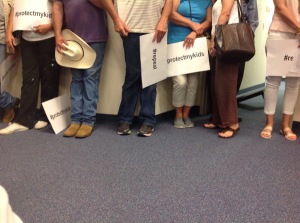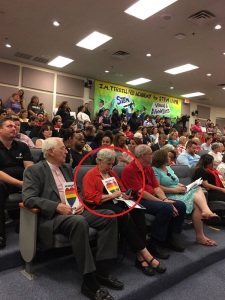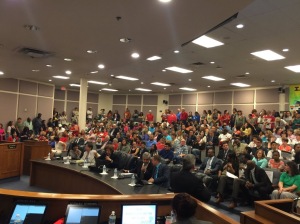Potty warfare came to Fort Worth, Texas this week.
Fort Worth, if you don’t know it, is a city of remarkable politics. Dallas’ lesser known neighbor isn’t that small – our county population is about 2 million people – but its citizens take pride in the small town feel of the city. Tarrant County votes deep red. Elected officials are mostly Republicans. Yet, the city has a long history of liberals and conservatives coexisting like a tossed salad. Even though we’re different, we all go so well together. Perhaps more than anything, we try to be neighborly. We get along with each other even as we routinely (if politely) mock the ugly and divisive politics in the city to our east.
It’s generally unlike Fort Worth to lurch into controversial issues where both sides entrench for civic warfare. Yet the FWISD did just that when it adopted, in secret, a new “mandatory” policy for transgender students. You can read the entire policy here.
The policy is remarkable in its sweeping acceptance and adoption of LGBT positions on unresolved issues. Gender isn’t biological. It’s “assigned” by society at birth, so school district personnel must accept a new definition of gender to include a person’s “perceived sex.”
The policy restricts the ability of teachers to freely discuss the issue with their students and even excludes parents. No verification is required. Whatever the student says, goes:
“Most importantly, transitions are private and personal, and information about a transition should not be discussed unless conversation is initiated and led by the transgender person.”
“School personnel must not question any student’s sincerely held belief regarding his or her gender identity once established and known.”
“School personnel may only share [information on gender identity] on a need-to-know basis or as the student directs. This includes sharing information with the student’s parent or guardian.”
The FWISD policy actually forces gender normative students to feel excluded:
“If other students feel uncomfortable sharing a restroom with a transgender student…the school must allow the student(s) access to a single stall restroom [or other private accommodation].”
I get dysphoria just reading that sentence. The FWISD policy wants to make sure some small percentage of transgender kids (.3 % of the student body?) feel comfortable. So, to do so, it will tell the other 99.7% that if they feel uncomfortable, they can go off to a secluded spot.
But this option, per the policy, shall not apply to the transgender kid:
“The single-user restroom, however, must not be given as the only option for transgender students who need or desire increased privacy.”
The cognitive dissonance here is stunning. It would be discriminatory and improper to ask a transgender kid to change clothes or use the restroom without other kids around, but it is perfectly fine to tell a girl who is uncomfortable with a guy in her changing room, “OK, sugar. You can run down the hall to the janitor’s bathroom. He’s usually not there until 3 pm.”
Forty-percent (40%) of FWISD schools are failing, yet one (Democrat) education board member boasted on her web page that “months of work” went into crafting the transgender policy. Good focus, champ. Way to devote resources to solving the nonexistent transgender “problem” when the kids can’t even spell “gender” and think the “trans” are the big cars that blow whistles. Most importantly, the policy was crafted in utter secrecy, outside of normal parameters of input from citizens and parents.
Into the Bowels
I doubt FWISD has ever seen a meeting like tonight’s.
On a staggeringly hot May afternoon, the line started to form outside the building where the meeting would be held. The pro-LGBT forces were far more organized than the still stunned parents and other concerned citizens who belatedly learned of the new radical policy.
The pro-forces were color coordinated for the most part, wearing red t-shirts (obviously printed in advance) and carrying rainbow signs declaring support for Superintendent Scribner. It’s almost as though they were prepared for this controversy.
The LGBT forces dominated the early arriving part of the line. This turned out to be important due to the limited seating in the meeting room.
Later, a group opposing the policy showed up with simple black and white signs reading #ProtectMyKids and #Repeal, so opposition was at least in the game even if playing from behind.

People sweated in the sun and generally conversed politely while camera crews stalked the parking lot and a TV helicopter hovered overhead to film the line snaking around the parking lot and down the street.
I saw some people I know, both pro and anti, including a very skilled attorney I know. He’s a good guy and a good lawyer. Several years ago, however, he announced he was gay, divorced his wife and adopted a new lifestyle. (He ended up being one of the speakers before the board.)
LGBT supporting clergy from liberal denominations stood both before and behind me.
A reporter stopped to interview the LGBT advocates directly in front of me in line. “I’m fine with it,” she purred to the reporter, “I’d be more concerned about my kid using the bathroom with a Republican than with a transgender person.”

Behind me, a gentleman tricked someone into giving him a #ProtectOurKids sign then immediately ripped it up. This prompted my main “interaction” of the event.
“That wasn’t very nice,” I told him. “You know, one of the great things about this city is that we can address our differences without rancor. We can be neighbors even when we disagree.” Perhaps he only expected his comrades to see and chuckle at his subtle ridicule of the opposition, but he sheepishly grinned at me and replied, “I’m being polite!”
When the doors finally opened, I was one of the lucky ones to make it into the main meeting room.
After exhaustingly long various recognitions, elementary school songs and mundane items, the agenda eventually moved to the issue at hand. The seats were all filled. People stood all in the back of the ampitheatered room and also sat on the steps between seats. “Late” arrivers filled the overflow rooms where video monitors allowed them to watch and cheer, their muffled approval drifting into the actual meeting.

FWISD’s new superintendent is a hot shot, poached from Phoenix, AZ, where he supposedly achieved success in educational excellence. If he had an uninformed audience, his opening remarks would have been very well received. He was, however, incredibly disingenuous, and I was informed. So, his opening remarks greatly disappointed.
He implied that the concerned citizens didn’t know what was “really in” the guidelines. (I had a copy in my lap.) He implied that this was a mountain out of a molehill and the whole thing was really unimportant, merely “guidelines.” (Read the link above. They’re mandatory.) He also said the policy was not a bathroom policy. (Every single “pro” speaker that followed focused on bathrooms.)
The LGBT attendees gave him rounding applause, most standing. I cocked my head in disdain at his obvious disrespect of his audience.
Then came the speakers.
If you’ve read this far, kudos to you. This is really the most important part.
In order to speak, you needed to be aware of this issue in advance, and you needed to sign up to speak. Only one hour was allowed, and every speaker was limited to 3 minutes. The crowd made sure to silence anyone who hoped to go past their 3 minutes, with shouts of, “Time! Time!”
Both “sides” brought persuasive speakers.
Many of the LGBT advocates were “transitioned.” A bearded clergyman with a deep, strong voice talked about his 20 years in ministry and preached about how Jesus reached out to the powerless and oppressed. He then said he was a transgendered man, which I took to mean he was born as a woman. Honestly, he surprised me.
Others who spoke for the LGBT side were obviously not quite matching of any gender. A hulking older woman with massive grandma breasts but a male voice and stringy man hair spoke movingly about attempts at suicide in her youth. (Indeed, several pro-policy advocates discussed suicide.)
My lawyer friend claimed a 4th Circuit decision placed FWISD federal funding at risk. (Texas is in the 5th Circuit, and federal funding is maybe 1% of the budget.) He alluded to the bridge at Selma, comparing opponents to old south racists. This drew hoots and boos from the crowd and clear indignation from several black attendees.
As a group, the “pro” folks effusively thanked the board and the superintendent. They talked about how tough it is to be transgender, how terrible it is to discriminate. Many of them quoted scripture intended, I think, as digs at what they believe to be hypocrisy in (supposedly) religious opposition.
None of them touched on, for even one breath, the concerns of parents and kids who question or oppose the guidelines. Indeed, one of them said that the issue was not up for debate at all. “We don’t vote on discrimination.”
The “repeal” side first and foremost argued that the superintendent and others acted improperly by working up the new policy in secret, without public comment and parental input. Undoubtedly correct. They also expressed concerns about the district adopting official policy to force school district personnel to conceal information from parents about their own kids. They also made repeated reference to the 40% failing school rate and whether this divisive policy was a wise use of board time.
The divided crowd roared, cheered & applauded in favor of their respective champions. One LGBT fan nearby would murmur “amen” every time someone made a religious point in favor of the policy. A pastor behind me exclaimed several times in disgust, “That’s a man!,” to instruct his group that the woman speaking was, in his mind, a freak. Mostly, however, though both sides were boisterous, both sides restrained themselves admirably.
Neither side, however, reached the other. Perhaps it is a Sisyphean task, but I think not.
I actually found myself moved by the sadness and concern of several of the LGBT speakers. I want my city and my schools to encourage kindness towards kids battling with confusion over gender.
What no one broached was the feelings of the non-trans kids at FWISD schools.
Speaker after speaker on the LGBT side talked about how awful it was as a boy, who felt like he was a girl, to have to use the boys’ bathroom at school. It was frightening and uncomfortable, because he “knew” inside that he was a girl.
But what about a 14 year old girl who would be horrified if her dad accidentally saw her in panties and a bra, much less have a strange boy at school see her change clothes or use the restroom? What if she doesn’t want to see a boy’s penis when he changes clothes for sports – but does so in her locker room? What about her right to privacy?
No one on the LGBT side of things has answered that question for me. The reason is, perhaps, that the only answer is that the girl is guilty of wrong thinking. She should accept that the boy in her locker room is not really a boy. Instead, because that boy identifies as a girl, she should ignore his penis, pretend he’s a girl and not feel embarrassed. Or, if she can’t help her embarrassment, she should hide it deep down inside and feel guilty about it.
That’s not a good answer.
No one, however, really raised the question. To me, that question is fundamental. Society must carefully balance competing interests. The interests in the great potty debate are competing. That 14 year old girl has just as much right as that 14 year old transgender kid to not feel embarrassed or ashamed.
Does the transgender kid “win” just because he or she is part of a minority? Does big government step in and compel teachers to accept radical gender theory as fact? To place government divides between parents and children?
Can’t a fabulous city like Fort Worth find a compromise somewhere in the middle in a way that respects both the minuscule percentage of transgender kids and the vast majority of those who aren’t?
The meeting ended when the 1 hour clock on public comments expired. A black preacher wanted to talk and loudly intoned that the board was making a mockery of democracy by so limiting discussion. A FW policeman forcefully but respectfully pulled him out of the room.
A chant of “protect our kids” arose from portions of the crowd, but instead of building up like some trite movie scene, the chant died after a few moments.
People mingled and slowly began to exit. Outside, a whipping North Texas supercell had moved in. Heavy rain and winds gusting to 70 mph kept most of the crowd inside the building.
My wife and daughter, however, awaited my arrival for dinner. So, I jogged through the torrent to my car, getting soaked and wondering if the sudden maelstrom was symbolic of how such an unusual issue has so quickly disrupted and divided our city.
As I finish this blog, the rain has moved on. Tomorrow, the grass will grow thick and green, and hopefully, the school board will take the chance to look anew at the controversial guidelines.
Unfortunately, as our society is going, even in my city, I am expecting the zealous liberal advocates to “dig in” and force their bathroom views on everyone else.

Nice summary. Thanks for going. Saddened that this could happen in Fort Worth. This makes me think that we need to stop bringing in out-of-state administration officials when we have a wealth of resources in this great state.
LikeLike
You seem intelligent so I’m sure you’re familiar with fallacies of relevance. All of this noise is over guidelines for a policy that was voted on by the board and developed with the community in 2014 – Dr. Scribner has been in Fort Worth 6 months. No where in the policy does it permit girls in the restroom with boys or boys in the restroom with girls. You had the policy in your lap, so you know what I’m talking about. Merely that privacy will be accommodated and respected. The policy reads that in these cases single stall restrooms are provided. Quit trying to make bathrooms erotic.
LikeLike
Hi there, Senator.
I don’t know the arcane procedural history of the Guidelines, nor is that history particularly relevant to me. What is clear is that the public at large was unaware. This is a controversial issue. The public is concerned, and those concerns merit engagement. Suggesting it is fait accompli is disrespectful of district parents. We’re talking about good people with good hearts. Smart people. Involved people. Parents. They deserve involvement, and the board should reconsider the policy based on their involvement.
Nearly every speaker for the LGBT side discussed the need to use restrooms. I’m unclear how you can say the guidelines don’t require transgender girls (i.e., boys) to be able to enter the girls’ restrooms or locker rooms. I quoted the provisions in the blog. The policy is designed to single out the non-transgender kids who have privacy concerns and accommodate them with an alternative. The policy assumes without saying so that most of the gender normative kids will have no problems. The policy also makes clear that schools cannot require transgender kids to use a single stall bathroom as their only option.
Look, it does no good to talk “around” the issue, and I think it is disingenuous on your part. If you can read the Guidelines so differently, then they are poorly worded. I’m an attorney, and I read and interpret such things for a living. I can see exactly how the guidelines are intended. How a judge, for example, would apply them.
Finally, as to your comment on eroticism. You could find that nowhere in what I wrote. I mentioned that many teenage girls wouldn’t want to be seen in a bra by their own dad. That’s not erotic in any way. Call it modesty, shyness or whatever…it’s totally normal. People deserve reasonable privacy.
I call on the FWISD Board to reconvene and find a new policy that respects all concerned. I absolutely want transgender kids to feel comfortable, secure and happy in Fort Worth schools. There are ways that can be accomplished without making other kids uncomfortable. I don’t think the current guidelines achieve that. Wouldn’t it be a good thing if the Board came together with concerned parents and LGBT advocates as well, and created guidelines that did? That’s what I hope happens.
LikeLike